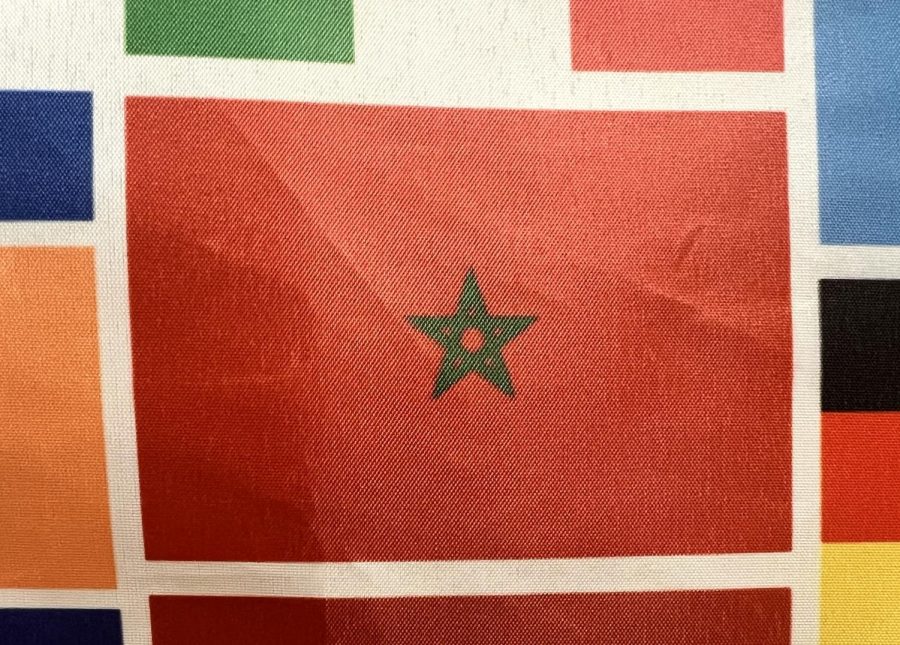Morocco kicks off history
World Cup success impacts more than the game
Moroccan flag hangs in Park after their World Cup victories Jan 6. Morocco is the first African country to ever reach the semi-finals for the World Cup.
January 9, 2023
As the 2022 World Cup comes to a close, one of the many topics of discussion is Morocco’s qualification for the semifinals. After taking a 1-0 win against Portugal Dec. 10, Morocco made history as the first African and Muslim country to make it to the semifinals. Though Morocco lost the third place game 2-1 against Croatia, the implications Morocco’s victories have on athletes around the world remains.
Soccer coach Patrick Hartman said the historical qualification is exciting due to how European dominated soccer has been.
“There’s a lot of good African teams and obviously Morocco is not the least of them. Soccer is very eurocentric and that’s mainly because a lot of the big leagues are (in Europe),” Hartman said. “Even good players from other continents end up going to Europe because that’s where the most competitive leagues are. An African country has never made it this far before, which is not only super exciting but opens the door for new opportunities in the future.”
Sophomore Lucas Tangelson said Morocco’s success is important due to the representation Morocco offers.
“It’s super sick, they were the first African nation to make it to the semifinals. Morocco is an underdog so it was really cool to see them excel,” Tangelson said. “A lot of people come together when they realize that an African nation is able to make it that far, especially when they haven’t made it that far before. Morocco represents all those people who are watching them and rooting for the first African country in the semifinals.”
Hartman said that the passion around Morocco’s achievements comes from a cultural fixation on soccer.
“One thing it’s hard to wrap our heads around in the United States is how ingrained soccer is in people’s culture,” Hartman said. “ Everyone loves soccer, but we just don’t have that passion in (the United States). Morocco is a big deal because soccer is so ingrained in the culture of all these countries. It’s not just about soccer.”
Sophomore Marley Curtis said he felt represented when he saw an African soccer team qualify for the semifinals.
“It feels good to know that people from my culture are making it this far into the World Cup. It’s cool to see that representation,” Curtis said. “Being the first black team to make it to the semifinals is super crazy. I’m not even a soccer fan but I was rooting for them the whole time. It’s cool to see that African people can do anything, including the things that mainly white people have done up until now.”
Hartman said Morocco’s performance in the World Cup has given his students of color positive image to look up to.
“I’ve had students who are African but not from any of the countries that compete in the World Cup that are rooting for any of the African teams in the World Cup to win. Just the affinity there shows the amount of passion that comes with representation,” Hartman said. “It’s really important to see yourself in people that are reaching success. Morocco has an identity beyond just Africa, because it has some correlation with Arabia as well. It’s a good source of positive representation for a lot of people who don’t often get that.”
Curtis said this representation will give student athletes of color more confidence in their own abilities.
“This will give student athletes of color more confidence in their game and help them realize that they can achieve great things,” Curtis said. “If an African team is going to something as big as the World Cup it can definitely bring African athletes’ confidence up. Now they’re thinking, ‘I can do that.’”
Hartman said he’s confident that Morocco’s achievements will have a positive impact on students of color.
“If they can see themselves in a team that made it to the semifinals of the World Cup they start to think, ‘Oh I can do that.’ South Americans and Europeans have been able to feel that way for a long time, but Africans haven’t,” Hartman said. “This representation isn’t just about success in soccer, but showing students of color that people like them can be successful in anything they want.”




